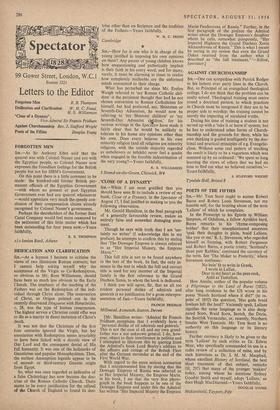POETS OF THE FIFTIES
SIR,—Mr. Tom Scott ought to accuse Robert Burns and Robert Louis Stevenson, not my humble self, for the bruiting about of the term 'Lallans' of which he complains.
In the Postscript to his Epistle to William Simpson, of Ochiltree, a fellow Ayrshire bard, Burns remarks to his 'rhyme-composing brither' that their unsophisticated ancestors 'spak their thoughts in plain, braid Lallans, like you or me.' R. L. Stevenson, who regarded himself as forming, with Robert Fergusson and Robert Burns, a poetic trinity, 'Scotland's three puir Rabbies,' continued the currency of the term. See 'The Maker to Posterity,' where Stevenson confesses: No bein' fit to write in Greek, I wrote in Lallan, Dear to my heart as the peat-reek, Auld as Tantallon.
Hew Ainslie, author of the popular volume A Pilgrimage to the Land of Burns (1822), after long residence in the US wrote in his poem 'Stands Scotland where it did?' (in re- print of 1892) the question, 'Has gude braid lawlans left the land?' Variously spelt, Lallans signifies the same language as is also desig- nated Scots, Braid Scots, Scotch, the Doric, the Scottish Vernacular, or, recently, Northern Insular West Teutonic. Mr. Tom Scott is no authority on this language or its literary history.
Further currency is likely to be given to the term 'Lallans' by such critics as Dr. Edwin Muir, who specifically commended its use in a radio review of a collection of mine, and by such historians as Dr. I. M. M. Macphail, whose excellent History of Scotland, the best short treatment of that subject, remarks (II, 297) that many of the younger `makars' today, among whom he mentions Sydney Goodsir Smith and myself, adopt 'Lallans,' as does Hugh MacDiarmid.—Yours faithfully,
Makarsbield, Tayport, Fife DOUGLAS YOUNG


































 Previous page
Previous page